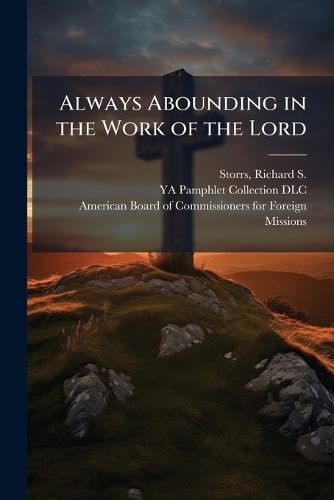Readings Newsletter
Become a Readings Member to make your shopping experience even easier.
Sign in or sign up for free!
You’re not far away from qualifying for FREE standard shipping within Australia
You’ve qualified for FREE standard shipping within Australia
The cart is loading…






"Always Abounding in the Work of the Lord" is a historical pamphlet, possibly a published sermon or address, delivered by Richard S. Storrs, likely in the mid-19th century. The work reflects the religious zeal and missionary spirit prevalent during that era, specifically focusing on the activities and importance of the American Board of Commissioners for Foreign Missions.
Storrs's discourse provides insight into the motivations, challenges, and perceived successes of American foreign missions. It serves as a valuable primary source for understanding the religious and cultural landscape of the United States during a period of significant expansion and social reform. The pamphlet offers a glimpse into the rhetoric and ideologies that shaped American missionary efforts and their impact on communities abroad.
This work has been selected by scholars as being culturally important, and is part of the knowledge base of civilization as we know it. This work was reproduced from the original artifact, and remains as true to the original work as possible. Therefore, you will see the original copyright references, library stamps (as most of these works have been housed in our most important libraries around the world), and other notations in the work.
This work is in the public domain in the United States of America, and possibly other nations. Within the United States, you may freely copy and distribute this work, as no entity (individual or corporate) has a copyright on the body of the work.
As a reproduction of a historical artifact, this work may contain missing or blurred pages, poor pictures, errant marks, etc. Scholars believe, and we concur, that this work is important enough to be preserved, reproduced, and made generally available to the public. We appreciate your support of the preservation process, and thank you for being an important part of keeping this knowledge alive and relevant.
$9.00 standard shipping within Australia
FREE standard shipping within Australia for orders over $100.00
Express & International shipping calculated at checkout
Stock availability can be subject to change without notice. We recommend calling the shop or contacting our online team to check availability of low stock items. Please see our Shopping Online page for more details.
"Always Abounding in the Work of the Lord" is a historical pamphlet, possibly a published sermon or address, delivered by Richard S. Storrs, likely in the mid-19th century. The work reflects the religious zeal and missionary spirit prevalent during that era, specifically focusing on the activities and importance of the American Board of Commissioners for Foreign Missions.
Storrs's discourse provides insight into the motivations, challenges, and perceived successes of American foreign missions. It serves as a valuable primary source for understanding the religious and cultural landscape of the United States during a period of significant expansion and social reform. The pamphlet offers a glimpse into the rhetoric and ideologies that shaped American missionary efforts and their impact on communities abroad.
This work has been selected by scholars as being culturally important, and is part of the knowledge base of civilization as we know it. This work was reproduced from the original artifact, and remains as true to the original work as possible. Therefore, you will see the original copyright references, library stamps (as most of these works have been housed in our most important libraries around the world), and other notations in the work.
This work is in the public domain in the United States of America, and possibly other nations. Within the United States, you may freely copy and distribute this work, as no entity (individual or corporate) has a copyright on the body of the work.
As a reproduction of a historical artifact, this work may contain missing or blurred pages, poor pictures, errant marks, etc. Scholars believe, and we concur, that this work is important enough to be preserved, reproduced, and made generally available to the public. We appreciate your support of the preservation process, and thank you for being an important part of keeping this knowledge alive and relevant.